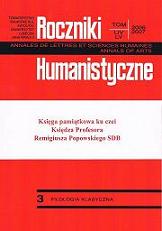Schematy składniowe grup nominalnych w łacinie wyodrębnione na podstawie konotacji leksemów rzeczownikowych
The Syntactic Schemas of Nominal Groups in Latin
Author(s): Małgorzata GórskaSubject(s): Language and Literature Studies
Published by: Towarzystwo Naukowe KUL & Katolicki Uniwersytet Lubelski Jana Pawła II
Keywords: syntactic connotation; connotation of Latin nominal lexems; nominal group; Latin nominal groups; syntactic schemes of Latin nominal groups
Summary/Abstract: The paper seeks to present a tentative list of syntactic schemes, according to which a certain type of nominal groups in Latin is constructed. These are groups with constitutive elements in the form of nominal lexems, having connotative properties. Connotation here is understood as a systematic property of lexems which consists in the fact that they open “empty places” (positions) to be filled in the text by definite (subordinate to them) elements called supplements. Like in other languages, the connotative properties in Latin is depicted by three types of nominal lexems. These are nouns derived from verbs, i.e. above all nomina actionis (e.g. reading – what?, by whom?) and nomina agentis (e.g. reader – of what?) and nouns derived from adjectives, i.e. first of all nomina essendi (e.g. lenght – of what?). The third type is composed of some nouns derivationally non-motivated. We find here among other things “relational” names of persons (e.g. son – whose?) or names of the parts of a certain whole (e.g. shore – of what?). The nominal lexems mentioned here may open one, two, three, or even four “empty places.” In the text they are filled with supplements in the form of nouns in the dependent cases, propositional phrases, constructions accusativus cum infinitivo, or even the whole sentences. The list contains ten syntactic schemes which are a symbolical inscription of the types of syntactic structures carried out in the texts by the Latin nominal groups. Such kind of schemes may be supplemented by a description of nominal groups in Latin, as the connotation of nominal lexems as a mechanism of making groups has not been, as it seems, taken into consideration up to now.
Journal: Roczniki Humanistyczne
- Issue Year: 54/2006
- Issue No: 03
- Page Range: 263-280
- Page Count: 18
- Language: Polish

